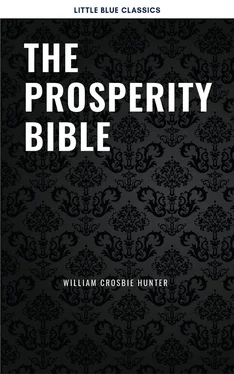Blue black blinkers blocked Black Blondin's eyes.
3. Do you say a bloo sky or a blue sky?
4. Compare the u sound in few and in new . Say each aloud, and decide which is correct, Noo York , New Yawk , or New York ?
5. Pay careful heed to the directions of this chapter in reading the following, from Hamlet. After the interview with the ghost of his father, Hamlet tells his friends Horatio and Marcellus that he intends to act a part:
Horatio . O day and night, but this is wondrous strange!
Hamlet . And therefore as a stranger give it welcome. There are more things in heaven and earth, Horatio, Than are dreamt of in your philosophy. But come; Here, as before, never, so help you mercy, How strange or odd so'er I bear myself,– As I perchance hereafter shall think meet To put an antic disposition on,– That you, at such times seeing me, never shall, With arms encumber'd thus, or this head-shake, Or by pronouncing of some doubtful phrase, As "Well, well, we know," or "We could, an if we would," Or "If we list to speak," or "There be, an if there might," Or such ambiguous giving-out, to note That you know aught of me: this not to do, So grace and mercy at your most need help you, Swear.
– Act I. Scene V.
6. Make a list of common errors of pronunciation, saying which are due to faulty articulation, wrong accentuation, and incomplete enunciation. In each case make the correction.
7. Criticise any speech you may have heard which displayed these faults.
8. Explain how the false shame of seeming to be too precise may hinder us from cultivating perfect verbal utterance.
9. Over-precision is likewise a fault. To bring out any syllable unduly is to caricature the word. Be moderate in reading the following:
THE LAST SPEECH OF MAXIMILIAN DE ROBESPIERRE
The enemies of the Republic call me tyrant! Were I such they would grovel at my feet. I should gorge them with gold, I should grant them immunity for their crimes, and they would be grateful. Were I such, the kings we have vanquished, far from denouncing Robespierre, would lend me their guilty support; there would be a covenant between them and me. Tyranny must have tools. But the enemies of tyranny,—whither does their path tend? To the tomb, and to immortality! What tyrant is my protector? To what faction do I belong? Yourselves! What faction, since the beginning of the Revolution, has crushed and annihilated so many detected traitors? You, the people,—our principles—are that faction—a faction to which I am devoted, and against which all the scoundrelism of the day is banded!
The confirmation of the Republic has been my object; and I know that the Republic can be established only on the eternal basis of morality. Against me, and against those who hold kindred principles, the league is formed. My life? Oh! my life I abandon without a regret! I have seen the past; and I foresee the future. What friend of this country would wish to survive the moment when he could no longer serve it,—when he could no longer defend innocence against oppression? Wherefore should I continue in an order of things, where intrigue eternally triumphs over truth; where justice is mocked; where passions the most abject, or fears the most absurd, over-ride the sacred interests of humanity? In witnessing the multitude of vices which the torrent of the Revolution has rolled in turbid communion with its civic virtues, I confess that I have sometimes feared that I should be sullied, in the eyes of posterity, by the impure neighborhood of unprincipled men, who had thrust themselves into association with the sincere friends of humanity; and I rejoice that these conspirators against my country have now, by their reckless rage, traced deep the line of demarcation between themselves and all true men.
Question history, and learn how all the defenders of liberty, in all times, have been overwhelmed by calumny. But their traducers died also. The good and the bad disappear alike from the earth; but in very different conditions. O Frenchmen! O my countrymen! Let not your enemies, with their desolating doctrines, degrade your souls, and enervate your virtues! No, Chaumette, no! Death is not "an eternal sleep!" Citizens! efface from the tomb that motto, graven by sacrilegious hands, which spreads over all nature a funereal crape, takes from oppressed innocence its support, and affronts the beneficent dispensation of death! Inscribe rather thereon these words: "Death is the commencement of immortality!" I leave to the oppressors of the People a terrible testament, which I proclaim with the independence befitting one whose career is so nearly ended; it is the awful truth—"Thou shalt die!"
15
THE TRUTH ABOUT GESTURE
When Whitefield acted an old blind man advancing by slow steps toward the edge of the precipice, Lord Chesterfield started up and cried: "Good God, he is gone!"
—Nathan Sheppard,
Before an Audience .
Gesture is really a simple matter that requires observation and common sense rather than a book of rules. Gesture is an outward expression of an inward condition. It is merely an effect—the effect of a mental or an emotional impulse struggling for expression through physical avenues.
You must not, however, begin at the wrong end: if you are troubled by your gestures, or a lack of gestures, attend to the cause, not the effect. It will not in the least help matters to tack on to your delivery a few mechanical movements. If the tree in your front yard is not growing to suit you, fertilize and water the soil and let the tree have sunshine. Obviously it will not help your tree to nail on a few branches. If your cistern is dry, wait until it rains; or bore a well. Why plunge a pump into a dry hole?
The speaker whose thoughts and emotions are welling within him like a mountain spring will not have much trouble to make gestures; it will be merely a question of properly directing them. If his enthusiasm for his subject is not such as to give him a natural impulse for dramatic action, it will avail nothing to furnish him with a long list of rules. He may tack on some movements, but they will look like the wilted branches nailed to a tree to simulate life. Gestures must be born, not built. A wooden horse may amuse the children, but it takes a live one to go somewhere.
It is not only impossible to lay down definite rules on this subject, but it would be silly to try, for everything depends on the speech, the occasion, the personality and feelings of the speaker, and the attitude of the audience. It is easy enough to forecast the result of multiplying seven by six, but it is impossible to tell any man what kind of gestures he will be impelled to use when he wishes to show his earnestness. We may tell him that many speakers close the hand, with the exception of the forefinger, and pointing that finger straight at the audience pour out their thoughts like a volley; or that others stamp one foot for emphasis; or that Mr. Bryan often slaps his hands together for great force, holding one palm upward in an easy manner; or that Gladstone would sometimes make a rush at the clerk's table in Parliament and smite it with his hand so forcefully that D'israeli once brought down the house by grimly congratulating himself that such a barrier stood between himself and "the honorable gentleman."
All these things, and a bookful more, may we tell the speaker, but we cannot know whether he can use these gestures or not, any more than we can decide whether he could wear Mr. Bryan's clothes. The best that can be done on this subject is to offer a few practical suggestions, and let personal good taste decide as to where effective dramatic action ends and extravagant motion begins.
Any Gesture That Merely Calls Attention to Itself Is Bad
Читать дальше












